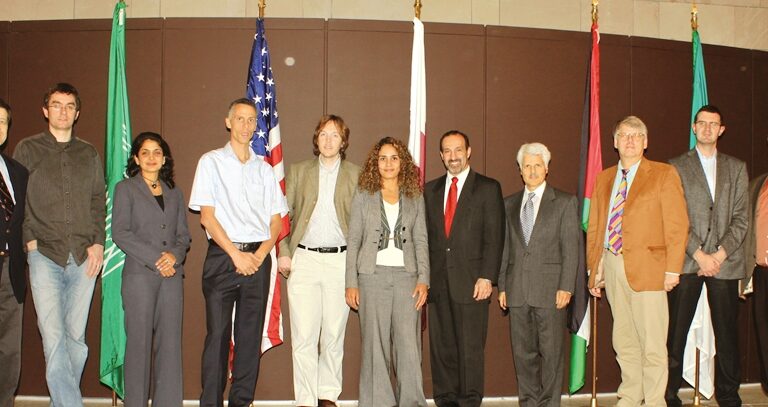Focused Discussions, Race & Society, Regional Studies
Political Economy of the Gulf Working Group II

On December 11–12, 2010, CIRS concluded the second session of its “Political Economy of the Gulf” research initiative with a two-day working group meeting that took place at Georgetown University in Qatar. Several experts on the political economy of the Gulf were invited back to Doha to present their chapter submissions and to discuss their original research during the two-day meeting. In the coming months, CIRS will gather the chapters in order to submit them for publication as an edited volume titled, The Political Economy of the Persian Gulf (Oxford University Press/Hurst, 2012).
The meeting was divided into several sections, including discussion on the demographic aspects of the GCC; the GCC monetary union; the “Dubai Model” of economic diversification; attempts at establishing knowledge-based economies in the GCC; the effects of rentierism on state autonomy; sovereign wealth funds; and Islamic banking models across the GCC.
The working group members discussed all of these issues within the overarching framework of rentierism and the relationships of mutual interdependence that become established between states and societies. Mutually beneficial rentier arrangements have guided the means in which the GCC countries have formed their oil-based economies and labor relations.
The working group participants examined the fact that over the past few years, the GCC states have become increasingly powerful actors on the global scene, and have become important markets for foreign investment. In order to adapt to changes within the global order, the concept of knowledge-based economies has become integral to the GCC states’ ambitious economic diversification attempts. In each GCC state, huge budgets have been allocated to programs that concentrate on issues of education, scientific research, increased flow of information, and investment in human capital.
The transition from oil-based economies to knowledge-based has had different levels of success in the various GCC states. The failure of the “Dubai Model” of economic development has meant that Dubai’s financial strategies, which were once seen as leading examples of economic progress in the region, are now being organized along more cautious and less ambitious investment plans. The GCC states’ various diversification plans, whether successful or not, have signaled official acknowledgment of the necessity of investing in a future of well-educated and qualified workforces that are able to compete in internationally.
Much of the budgets allocated to these diversification projects are funded by the GCC states’ sovereign wealth funds (SWF), which also came under examination by the working group members. Sovereign wealth funds are often constituted of staggering amounts of money that are used to sponsor large-scale projects in the interest of a country’s long-term development.
The participants discussed further financial considerations regarding “Islamic banking,” which was reported to be more developed in the Gulf region than anywhere else in the world. The participants examined Islamic banking methods across the various GCC states and compared them with those operating across Iran.
Members of the working group also looked at the political and economic possibilities of the GCC states forming a monetary union and how moving away from the U.S. dollar peg may or may not result in global imbalances in the value of the dollar. The participants concluded that many of the economic and political efforts currently underway in the GCC fall under a larger plan to establish the Gulf states as leading international powers. The GCC states have attempted to enhance their political stability both regionally and internationally and to increase their international bargaining power.
- Read more about this research initiative
Participants and Discussants:
Alexis Antoniades, Georgetown University School of Foreign Service in QatarZahra Babar, Georgetown University School of Foreign Service in QatarJohn T. Crist, Georgetown University School of Foreign Service in QatarChristopher Davidson, Durham UniversityNada Eissa, Georgetown University School of Foreign Service in QatarSteffen Hertog, London School of EconomicsMehran Kamrava, Georgetown University School of Foreign Service in QatarFred Lawson, Mills CollegeSuzi Mirgani, Georgetown University School of Foreign Service in QatarDjavad Salehi-Isfahani, Virginia Tech UniversityJean-François Seznec, Georgetown UniversityNadia Talpur, Georgetown University School of Foreign Service in QatarKristian Coates Ulrichsen, London School of EconomicsRodney Wilson, Durham UniversityMohamed Zayani, Georgetown University School of Foreign Service in Qatar
Article by Suzi Mirgani, CIRS Publications Coordinator